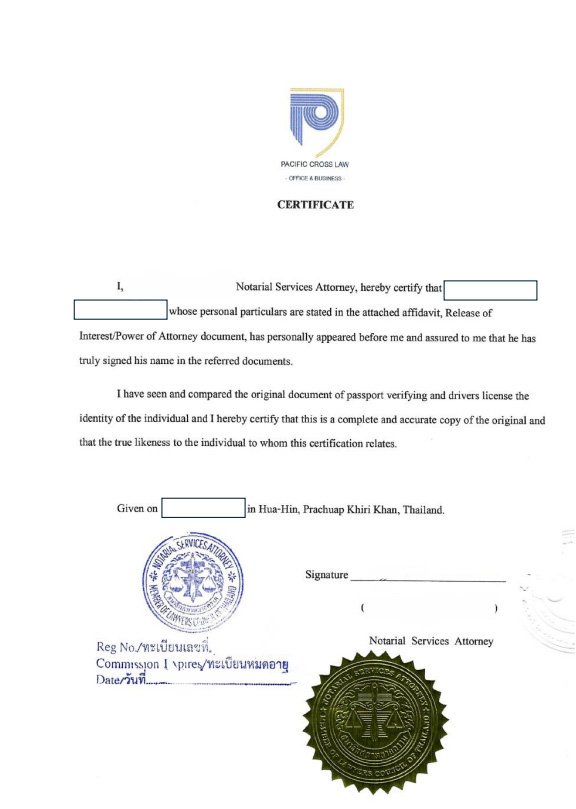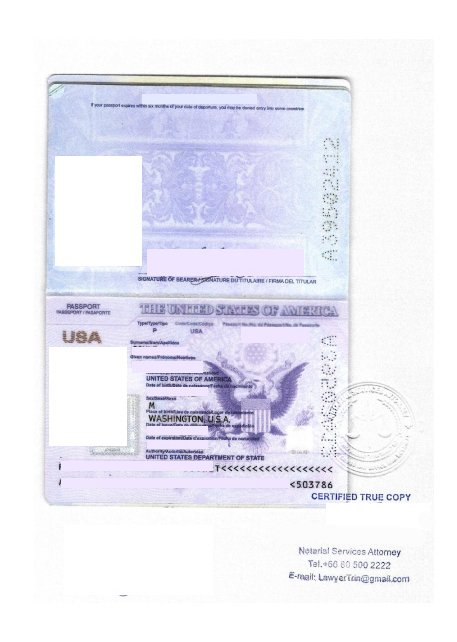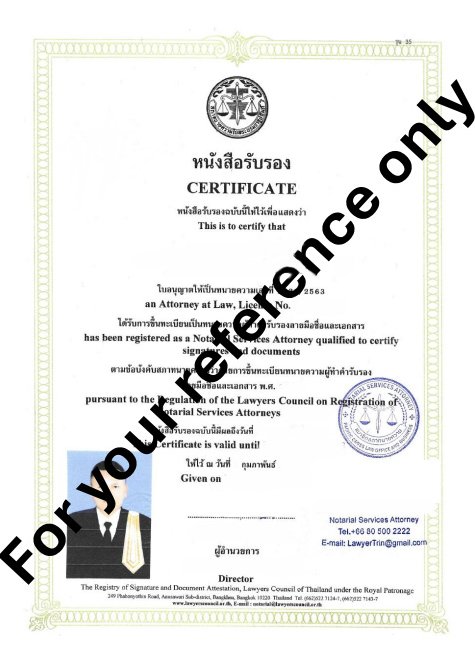What is "Notarial Services Attorney"?
Notarial Services Attorney means that a licensed lawyer (attorney) who has been certified as a Notarial Services Attorney provides official certification of documents. This is common in Thailand and other countries where notaries must be legally trained.
Types of Notary Services Provided




Types and Formats of Signature & Document Certifications
These are the standard formats used in notarial practice, each serving a specific legal or procedural purpose:
1. Signature Witnessing Format
A notarial officer observes the individual signing a document in person and confirms that the signature was made voluntarily. The officer may also verify the signers identity using official identification.
- Used when the notarial officer witnesses the signer signing the document in person.
- Typically includes the statement: Signed before me on [date], followed by the officers name, signature, and official seal.
2. Acknowledgement Format
The signer confirms to the notary that they personally signed the document and did so willingly. This can be done even if the signing did not occur in the notarys presence.
- Applied when the signer appears before the officer to confirm they previously signed the document voluntarily.
- Includes the phrases: personally appeared and executed the same to affirm identity and intent.
3. Notarized Translation Format
A document translated into another language is certified as accurate and complete by a qualified translator or authorized notarial officer. This is often required for use by embassies or foreign authorities.
- Used to certify that the document has been accurately translated from the original language.
- Includes a statement from the translator confirming accuracy, along with the notarial officers certification and signature.
4. Notarized Copy Format
An official compares the original document and its copy, then certifies that the copy is a true and correct reproduction of the original.
- Confirms that the attached copy is a true and correct reproduction of the original document.
- Includes the declaration: I certify this is a true copy of the original document, accompanied by the notary's signature and seal.
5. Notarized Affidavit Format
A written statement in which the declarant affirms the truthfulness of the content. The document is then signed in front of a notary or authorized officer who certifies both the signature and the declaration.
- Used when the affiant makes a sworn written statement in the presence of the notary.
- Typically begins with the heading Affidavit and contains the phrase: has personally appeared before me and sworn to the truth of the contents herein.
6. Certification of Persons Capacity Format
This involves verifying not only that a document has been properly signed, but also that the signer has the legal capacity or official status to actfor example, as a company director, property owner, or appointed representative. Supporting documents such as a company affidavit, ID card, or appointment letter may be required.
- Verifies a persons legal role or authority, such as their position in a company or ownership status.
- Includes the persons name, title, and affiliated organization, and references any supporting documents examined to confirm their legal capacity.
Certification of a Separate Attached Document
These are the common types of notarial certifications, each serving a specific legal function:
1. Certification of Document Copy (Certified True Copy)
Confirms that the attached document is a true and complete copy of the original.
- Used when the notarial officer has seen the original and verified that the copy has not been modified.
2. Certification of Copy Without Endorsing the Content
States that the document is a copy, but the certifier does not validate or assume responsibility for its contents.
- Used when the content is in a foreign language or outside the certifiers scope of verification.
3. Certification of a Person as the Signatory
Verifies that the individual who signed the document is indeed the person named therein.
- Commonly applied in legal agreements, contracts, or personal declarations.
4. Certification of Signature, Position, and Signing Authority
Confirms that the signer holds a specific role (e.g., Director) and is authorized to sign on behalf of a company or organization.
- Frequently used in corporate documents.
5. Certification of a Separate Document
Affirms the authenticity or accuracy of a document that is attached or submitted separately.
- For instance, accompanying certificates, letters, or affidavits.
6. Certification of Identity Through Signature Verification
Verifies that the signature matches the known or previously verified signature of the individual.
- Used when identity verification relies on signature consistency.
7. Certification of the Translators Signature in English Document Translation
Certifies that the translator signed the translated document and assumes responsibility for its accuracy.
- Builds credibility for use in official or international submissions.
8. Certification of Legal Entity Status, Signature, and Signing Authority
Affirms that the individual represents a recognized legal entity and has proper authority to act on its behalf.
- Especially relevant for corporate or organizational transactions.
9. Certification That the Individual is the Same Person as Referred to in the Document
Verifies that the individual presenting the document is the same person mentioned in it.
- Used when matching personal identity across documents, such as a passport or official records.
- HOME HOME
- ABOUT US ABOUT US
- SERVICES SERVICES
- ARTICLES ARTICLES
- CONTACT US CONTACT US